General Content
There are many reasons why someone donates to the SLH Foundation. Some individuals give a one-time pledge in honor or memory of a loved one; some community residents, staff members, or organizations donate on an annual basis; and yet others simply feel it is the right thing to do.
A few of our donors wanted to share their stories as to why it is important to donate to Canton-Potsdam Hospital or Gouverneur Hospital.
Video Donor Story | Hitchman Family
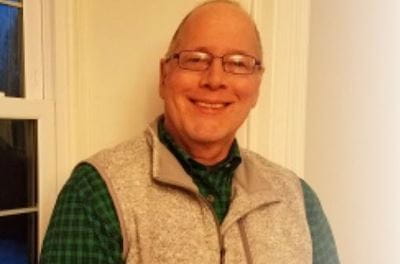
Resolve, an early diagnosis, and a committed team of doctors are helping Pete Beekman to live with cancer.
In 2012, Pete was diagnosed with Stage 1 multiple myeloma, a hematological (blood) cancer that develops in plasma cells, a type of white blood cell found in bone marrow.
His older sister, Denise, had been diagnosed with the disease the year before.
“As a candidate for a STEM cell transplant, the doctors looked first to Denise's family members,” he says. “I was a perfect match for her. But further testing revealed that I was exhibiting early signs of the same disease.”
“I could not help my sister and received my own difficult diagnosis,” he says. “That was very, very hard.”
With multiple myeloma, the cancerous plasma (myeloma) cells grow out of control, preventing the normal production of antibodies and interfering with the production and function of red and white blood cells. This can cause brittle bones, kidney problems, and a compromised immune system. Multiplying myeloma cells can also produce a tumor (plasmacytoma), which forms in bones and (occasionally) tissue.
An early cancer diagnosis often provides individuals with more treatment options and improved outcomes. But few early symptoms are associated with multiple myeloma, so most people are not diagnosed until the cancer has reached an advanced stage.
Pete, who was symptom-free at the time, was diagnosed with “monoclonal gammopathy of undetermined significance” (MGUS), a condition that is often a precursor for multiple myeloma. In MGUS, an abnormal protein (monoclonal protein or “M protein”) is detected in the blood stream; M protein is created in plasma cells in bone marrow.
“The cells in my marrow were starting to go haywire," he said.
Pete stayed close to his sister as she underwent treatment, including clinical trials at Dana-Farber Cancer Institute in Boston, and a pioneering treatment at the University of Pennsylvania. The procedure set back the progression of the disease a few months, but that was it. “She passed in 2014,” Pete stated
Throughout his sister’s struggle, Pete was working with an oncologist at Canton-Potsdam Hospital and getting his scans and blood work done. But in October, 2014, he fractured a rib playing hockey.
“I knew this wasn’t good,” he says.
Now diagnosed with Stage 2 (smoldering multiple myeloma or SMM) cancer, he was set for a clinical trial for SMM in early 2015 at Dana Farber Cancer Institute. But three months into the trial, he was typed at Stage 3 and a new treatment plan was needed. Pete responded well to the chemotherapy protocol. That fall, the doctors at Dana-Farber harvested his stem cells and he underwent a total transplant at Brigham and Women’s Hospital.
Today, he is in remission and follows a standard post-stem cell transplant maintenance treatment protocol, which includes bi-monthly infusions of chemotherapy that he receives at CPH’s Center for Cancer Care.
Pete works closely with hematologist-oncologist Dr. Velmalia Matthews-Smith at the Cancer Center.
“I cannot say enough good things about Dr. Vel and the treatment I receive at CPH,” he said. “Dr. Vel has all the numbers on a spreadsheet so I can see historically what is happening. And the oncology nurses at the Center for Cancer Care are the best.”
Every month, Pete has bloodwork done. “Most people will relapse,” he says. “But the longer you can go between relapses, the better the outcome.”
Pete and his sister are not the only members of the family afflicted by this disease, and today more research funding is being directed toward understanding the genetic component of the disease.
“My grandfather died in his 50s from ‘bone cancer’ and my mother was 81 and my aunt 83 when they died from it,” he says. “My sister was 63.”
His early diagnosis was, he says, “a gift.”
“It is likely that without my sister, I would not be having this conversation today. I would not have benefited from early treatment. I think about that, and about my sister, every day.”
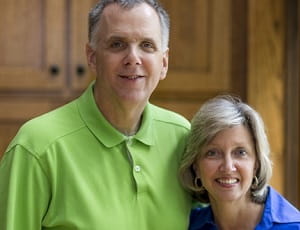
Nancy and Michael Griffin know what matters most: family and friends, careers and community. And the good health to make the most of these things.
Through a charitable bequest to the St. Lawrence Health Foundation, they are making a lasting impact on the community they love, by making sure their friends, neighbors, and those who will live, work, and raise families here in the future, will have the access to the same high-quality healthcare they have had.
“We are so fortunate to have a great hospital and first-rate healthcare programs in our rural community,” says Nancy. “It’s something that cannot be taken for granted.”
HOW IT STARTED
For 40 years, Nancy and Michael have made the North Country their home.
“When we first moved to the area we thought we would be here for a couple of years,” recalls Nancy. “But like so many people who come here, we decided to stay because we grew to love the community so much.”
It was in the early 1980s, when Michael and Nancy met as graduate students pursuing master’s degrees in communication at Clarion University in Pennsylvania. “We decided that when we graduated, whoever got the first job, the other would follow,” recalls Michael.
Nancy received the first offer. It was 1983 when she drove up to Potsdam to interview for a position as a graphic designer at SUNY Potsdam. That turned out to be the first and only job interview she has ever had.
Over the next three decades, Nancy and Michael built their careers; she continued at SUNY, eventually serving as a major gifts officer, while he assumed leadership roles in marketing and media relations at Clarkson University. Both retired in 2013.
WHEN COMMUNITY IS A PRIORITY
As they climbed the professional ladder at their respective institutions, they always made community leadership and service a priority. “I think it goes back to the way we were raised,” says Michael. “Both of us have been volunteering and fundraising since our student days.”
Michael has been an active member and officer of the Rotary Club since 1986, while Nancy helped to rebuild the Kiwanis Club. That led to the couple’s involvement as founding board members of the newly incorporated Potsdam Holiday Fund in 2003. Other nonprofits related to the arts, education, and animal welfare have also benefitted from the Griffins’ support.
But it is their support of Canton-Potsdam Hospital (CPH) and ongoing commitment to regional healthcare that promises to be their lasting gift to the community.
For more than 20 years, Michael and Nancy have supported CPH through volunteering and annual giving. “Healthcare was always on our radar but it really wasn’t until 2004, when I required emergency care, that I personally experienced what it means to have great medical care so close to home,” says Michael. “Not long after, Nancy experienced an illness that required serious medical treatment. We were so grateful for the level of care we received that we began to rethink the level of our commitment to the Hospital.”
A LASTING LEGACY
Today, Michael is a member of the board of directors for both CPH and the St. Lawrence Health, chairing the Quality Improvement and Patient Safety committee, while Nancy served on the board of the SLH Foundation for five years.
“This is an important time in rural healthcare,” says Michael. “Today, quality and results count more than ever. Consumer models have shifted and expectations have changed so we must work harder to provide care and deliver it in ways that best suit our patients.
“That also means recruiting the best doctors and medical personnel to our region,” he added. “And we are fortunate to be able to do that.”
The Griffins made a charitable bequest to the SLH Foundation that will support healthcare in the years to come.
Through their leadership giving, the Griffins hope to inspire others in the community to consider the impact of SLH in their own lives and provide support for the Hospital’s future.
“It is important to make annual gifts, but making CPH a part of your estate planning is an easy way to provide for its future,” says Nancy. “If enough people did this, think of the impact it would have and how it would transform our rural healthcare system.”
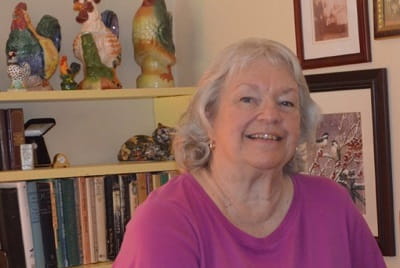
Patricia “Pat” Horan is a well-respected member of the of the Canton-Potsdam Hospital family. For sixteen years she served as the Assistant to the Chief Executive Officer. She retired in 2004. Pat is known as wonderful hostess, and many people still rave about the dinner parties she held at her home. Her specialty was Hungarian and Southern cuisine. For several years, Welcome Receptions for new physicians beginning their practice at CPH, were coordinated by Pat.
In 1975, Pat set out from Texas on her own for Potsdam, NY. Her parents followed her a few years later after her father retired from his position of Deputy District Clerk of the 186th District Court and her mother retired from her position supervising the security department at a large department store.
She is a true community builder, volunteering at the Potsdam Public Museum and using the resources of the Office of the Aging at CPH when she was able. Pat has coordinated several bus trips to local concerts for her living community.
Pat loves history and antiques. It was her passion for preserving CPH history that assured the repurposing of the iconic stone pineapple that graced the original Leroy Street entrance to the hospital. As you walk through the Healing Garden near the CPH Center for Cancer Care, you will now see the pineapple, a tribute to CPH history and Pat Horan’s persistence.
“I feel strongly about the excellent care Canton-Potsdam Hospital provides to our community. I know that my support, large or small, is making a difference for my friends and neighbors,” commented Pat.
Thank you Pat, for planning for the St. Lawrence Health Foundation, through the Foster and French Society, and in turn, ensuring our patients receive the best care possible, close to home, from a place they know and trust.
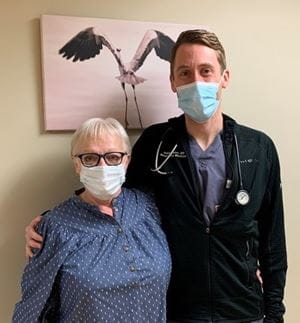
Ruth McClure, a resident of Gouverneur and active volunteer in the community, is grateful for Gouverneur Hospital.
Mrs. McClure was diagnosed with reflux several years ago and continued to have recurring symptoms since her diagnosis. One particular event happened in late summer serious enough for her to seek a professional opinion at the Gouverneur Hospital (GH) Emergency Department (ED).
She arrived at the ED a little confused, expecting to be treated and released quickly, but Dr. Adam Quinn recognized that what she was experiencing was the beginning of a “widow maker” heart attack with 99.9% blockage.
After hearing the diagnosis, Mrs. McClure was admittedly anxious and scared. “As soon as the ED staff realized I was starting to comprehend the magnitude of my diagnosis, they acted quickly to alleviate the stress and made me feel cared for and comfortable. They explained each test and result in terms I would understand and made me a partner in my care plan,” commented Mrs. McClure.
It was imperative that Mrs. McClure be transferred to a hospital with the capacity to perform the surgery necessary to save her life in a timely manner. Dr. Quinn and his staff worked quickly to stabilize her to ensure a safe transport to Crouse Health in Syracuse, NY.
Upon arrival at Crouse Health, the surgeon and cardiologist stated that the testing and care Mrs. McClure received at GH saved her life and praised Dr. Quinn and his staff.
“As an Emergency Medicine Physician, it is my job to treat and provide comfort to our patients at their most vulnerable time. I am thankful for the opportunity to meet Mrs. McClure again and see how well she is doing today. It’s why I chose to be a doctor: to see patients thriving after seeking emergency care,” commented Dr. Quinn.
Mrs. McClure is thankful for Gouverneur Hospital, knowing she has access to excellent care right here, close to her hometown.
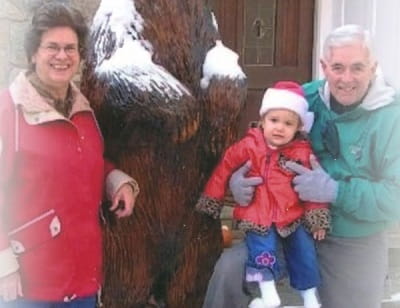
"Strong communities are built from within and excellent healthcare is the foundation."
Many people in the St. Lawrence area may know David Patterson as a Canton, N.Y. resident, longtime member of the CPH Board of Directors, and local business owner.
What they may not know is that David and his wife Ann donate to Canton-Potsdam Hospital every year because they have personal ties to both the St. Lawrence County community and the Hospital itself.
In 1921, David’s grandfather came to Canton as a feed salesman – a time when there were more than 3,000 St. Lawrence County farmers. Six years later in 1927, he bought the feed store on Miner Street. It would remain in the family for the next 88 years.
“In 1945, my father joined the business and they formed Wight & Patterson,” David recalls. “When my grandfather passed away seven years later, my father took over the store.”
In 1967, David joined the family business and when his own father died in 1978, he took up the task of running the store. With his wife Ann’s constant support in the business and at home, he was able to successfully operate Wight & Patterson, Inc. for 37 years, until he sold the company in 2015.
“Both my father and grandfather served as the mayor of Canton at one time. There’s still a plaque in the EJ Noble building that bears my grandfather’s name,” David says. “I suppose that I inherited my passion for community service from both of these men who were great influences in my life.”
Today, David Patterson is an Emeritus Member of the CPH Board of Trustees, after serving on the board for 30 years.
When asked why he supports CPH, he answers quite simply, “Ann and I are thankful for the community support we received at Wight & Patterson over the years, and planning for CPH is one way to show our appreciation.
“Both Ann and I know how important this Hospital is to our community,” he adds. “CPH has provided us with excellent care, so the least we can do is give back. It is important to us that we have a high-quality hospital in our area that will serve family, employees, friends, and the community.”
With the couple’s pledge to donate, and support from others like them, CPH will continue to provide the highest level of care to members of the St. Lawrence County community.
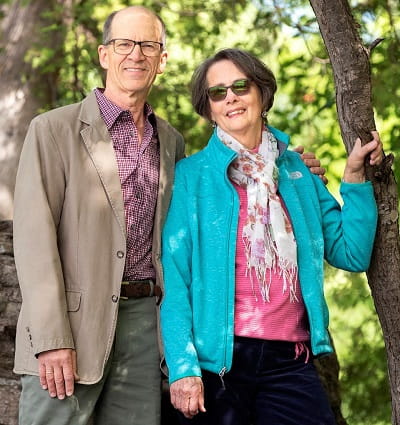
Over the years, my husband Pete and I have used Canton-Potsdam Hospital’s services for both inpatient and outpatient care. Our daughter was born at CPH 40 years ago, and recently Pete had an accident that required an emergency room visit, surgery, and physical therapy.
As CPH evolved into St. Lawrence Health and an affiliate of Rochester Regional Health, our health care needs have also grown. We are using multiple health specialties these days, and we’re grateful these services are available to us locally.
The care we have received has been at a consistently high level.
We give/donate with the hope that good health care close to home, will be available not just for us, but for all for generations to come.